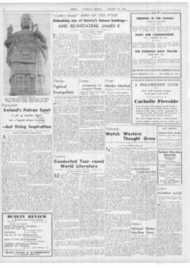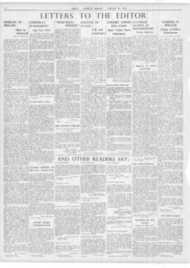Page 4, 20th January 1939
Page 4

Report an error
Noticed an error on this page?If you've noticed an error in this article please click here to report it.
Tags
Share
Related articles
Favourite Authors Visions And Revisions, By John Cowper...
Rugged Realities From Cowper Powys
The Po Ys Brothers
Satan Stalks
Contemplative
Criticism
Conducted Tour round World Literature
The Pleasures of Literature. By John Cowper Powys. (Cassell, 12s. 6d.) Reviewed by MARTIN TURNE.LL MT? .10 H N COWPER POWYS'S latest book contains twenty-one essays on some of the greatest writers of all time. Although the book seems to be intended partly as an introduction to literature for " the common reader," the pro gramme is an ambitious one. Mr Powys's list includes Homer, Dante, Shakespeare, Rabelais, Montaigne, Cervantes, Goethe, Dicken s, Dostoievsky and Proust. There is also a long essay on " The Bible as Literature," and a study of St. Paul which runs to seventy pages.
It is clearly a programme which could only be carried out successfully by an unusually well-informed and sensitive critic. Although some of the papers— notably those on Dante and Montaigne —contain interesting and provocative things, Mr Powys fails to convince us that he possesses the necessary qualifications. The Pleasures of Literature is planned on the lines of a conducted tour. Its explanations are frequently cursory and ill-informed, its judgments erratic and misleading. Like all professional guides, Mr Powys apparently feels the peed to startle and impress. His chapter on Dante opens with the words: "What a huge and bleeding gap— like the extraction of an eye-tooth from the Figure of Time—would be left by the remoimil of Dante from the Literature of the World?"
It is difficult to feel much confidence in the taste of a writer who is as Insensible to the use of words as the author of this sentence which is, unhappily, characteristic of Mr Powys's style. Nor are his opinions impressive. He is capable of telling us, with the triteness of one of the weaker primers of literature, that
"The women in Shakespeare are undoubtedly the noblest, sweete.st, wittiest, cleverest, loyaiest and most entirely lovable women in all literature"!
I N fairness to Mr Powye, it must be said that. he makes no attempt to conceal the fact that he is far more interested in Mr Powys and Mr Powys's emotions than the great writers he is supposed to be discussing. His aim, as hi tells us in his introductory chapter, is to deal not so much with
"The general. objectiveof any particular volume as being of supreme importance in the making of human history . . . as the emotional, realistic, and entirely personal effect it may have on our individual nerves, upon our secret pleasures and pains, upon our furtive psychological reactions, upon our' physical sensitivities, upon the hidden vices in us—"
and so on. This sort of thing will
appeal, no doubt, to admirers of the Powys " philosophy," and particularly to admirers of In Defence of Sensuality; but frankly I find it diflicult to discover any justification for such arrant individualism. The function of criticism must always be the objective evaluation of works of literature in relation to the life not of eccentric individuals, but of the community as a whole. This can only be done by a rigorous examination of the writer's text. Otherwise, criticism becomes merely " books about books," and the poem or the novel dissolves into a swirl of irrelevant and often unhealthy emotional outpourings.
Indeed, there seems to me to be something extremely unpleasant in the way in which Mr Powys dwells upon "secret pleasures," "furtive . . reactions " and "hidden vices " in the passage quoted above. His essays cannot be recommended for the inexperienced reader, who needs something like Mrs Virginia Woolf's superb book of unprofessional criticism, The Common Reader (First Series)—(a comparison between Mrs Woolf's essay on Greek tragedy and Mr Powys's curious performance is highly instructive). And since Mr Powys apparently has not troubled to acquaint himself with the important contributions which have lately been made by better critics than himself to many of the topics which he discusses here, he cannot expect to be taken very seriously by the specialist.
$eaman's Torch (reviewed in the CATHOLIC lieemai on December SO) was published by the National Book Association at 2s. 6d., available at this price to members only The edition for the public was published by Hutchinson at 3s. 6d.
Not Worth Reading, by Sir George Arthur (Longmans, 12s, fid.). Sir George can remember everything, from Garibaldi coming to London in 1864 till yesterday—of course, his book is worth reading.
blog comments powered by Disqus

















